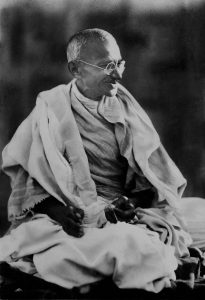Despite the imprecations of The Book of the Balance, there are many Thelemites who like to criticize prominent figures representing the Abrahamic religions while giving mulligans to other world religions and maintaining an adamantly blind eye to the flawed characters who’ve acted as prophet, priest(ess), and king/queens to Thelema. Finally, all humans are fallible and given to missteps and trying to cover up their failings. Perhaps best to focus on their teachings, the efficacy of same while acknowledging the shortcomings of same. Otherwise — hard to imagine reading the actual correspondence of the Prophet of the Lovely Star included in Martin Starr’s Unknown God and remain enthusiastic about following his teachings; Crowley himself, in his better moments, despaired of his baggage and voiced the hope that his methods of attainment would someday be employed by those without such encumbrances.
One object lesson in all this could be the case of Mohandas Karamchand Gandhi, idolized by millions upon millions including the likes of Martin Luther King and Nelson Mandela and held up as an eidolon of efforts to use non-violence to advance social justice on nationwide levels. And yet – critics point out that he ignored the plight of South Africans fighting racism of “Untouchables” looking to overthrow India’s caste system, and that he recruiting his teenaged grandneice to share his bed with him to “test” his dedication to chastity. This is gone into in the book Gandhi: The Years That Changed The World, 1914-1948. So — do his failings compromise his achievements that the world at large has admired for decades? Do they invalidate his methodologies like non-violent protest that have proven so effective for so long? Intriguing questions, yes?
Here’s an excerpt of the New York Times Book Review coverage:
“It is difficult to write about a man who was a revered spiritual leader as well as a keen political operator. Guha, the author of ‘India After Gandhi’ and ‘Gandhi Before India’ (the first volume of the monumental biography that this book concludes), approaches Gandhi on his own terms while trying not to gloss over his flaws. Perhaps inevitably, with one who has been regarded almost as a saint, it is the flaws that will capture many readers’ attention. A key theme that emerges is Gandhi’s effort to control himself and those around him. This extended from his own family to his political allies and opponents.”
Read the whole thing here:
https://www.nytimes.com/2018/10/10/books/review/ramachandra-guha-gandhi.html.


